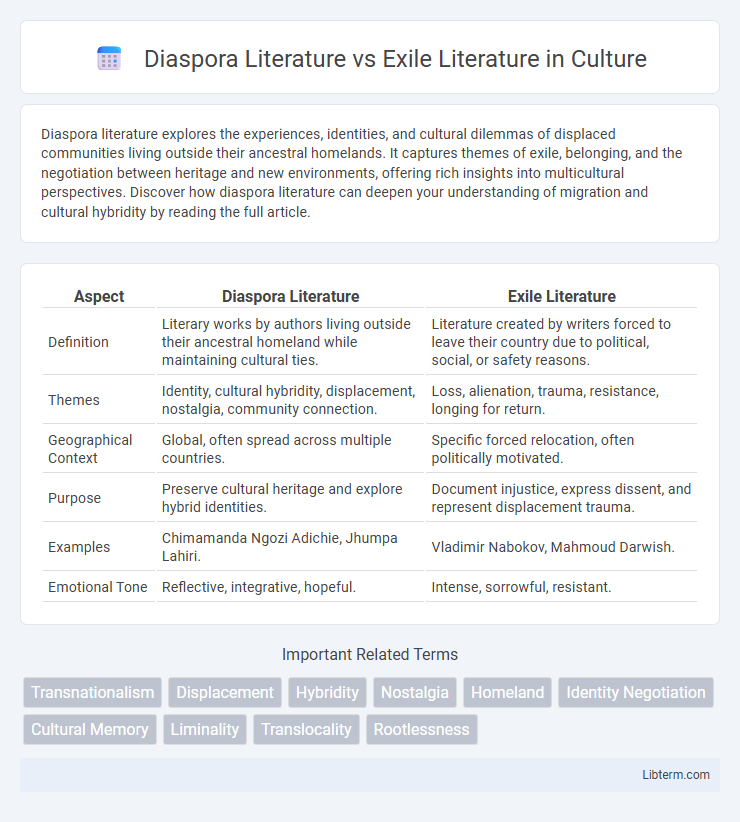Diaspora literature explores the experiences, identities, and cultural dilemmas of displaced communities living outside their ancestral homelands. It captures themes of exile, belonging, and the negotiation between heritage and new environments, offering rich insights into multicultural perspectives. Discover how diaspora literature can deepen your understanding of migration and cultural hybridity by reading the full article.
Table of Comparison
| Aspect | Diaspora Literature | Exile Literature |
|---|---|---|
| Definition | Literary works by authors living outside their ancestral homeland while maintaining cultural ties. | Literature created by writers forced to leave their country due to political, social, or safety reasons. |
| Themes | Identity, cultural hybridity, displacement, nostalgia, community connection. | Loss, alienation, trauma, resistance, longing for return. |
| Geographical Context | Global, often spread across multiple countries. | Specific forced relocation, often politically motivated. |
| Purpose | Preserve cultural heritage and explore hybrid identities. | Document injustice, express dissent, and represent displacement trauma. |
| Examples | Chimamanda Ngozi Adichie, Jhumpa Lahiri. | Vladimir Nabokov, Mahmoud Darwish. |
| Emotional Tone | Reflective, integrative, hopeful. | Intense, sorrowful, resistant. |
Defining Diaspora Literature
Diaspora literature explores narratives that emerge from communities dispersed beyond their ancestral homelands, emphasizing themes of cultural identity, displacement, and belonging. It often reflects the collective memory and experiences of migration, hybridity, and the negotiation of multiple cultural affiliations. Unlike exile literature, which centers on forced or voluntary departure from one's country due to political or personal reasons, diaspora literature captures the ongoing social and cultural dynamics within dispersed populations.
Understanding Exile Literature
Exile literature explores the emotional and psychological impact of forced displacement, emphasizing themes of loss, identity crisis, and cultural dislocation experienced by individuals uprooted from their homeland. Unlike diaspora literature, which often includes diverse experiences of voluntary migration and community-building across multiple generations, exile literature centers on the trauma and alienation of immediate separation from one's native country. This genre captures the profound sense of longing and estrangement, reflecting on the complex relationship between memory, homeland, and selfhood in the context of political or social exile.
Historical Roots: Diaspora and Exile Narratives
Diaspora literature emerges from the historical roots of mass migrations and forced displacements, reflecting collective memories of cultural dispersal and identity preservation across global communities. Exile literature is deeply rooted in political banishment and voluntary or involuntary separation from the homeland, often highlighting themes of loss, nostalgia, and resistance against oppressive regimes. Both genres intersect in their exploration of dislocation and the ongoing negotiation of selfhood amid historical upheavals.
Major Themes in Diaspora Literature
Diaspora literature primarily explores themes of identity fragmentation, cultural hybridity, and nostalgia for the homeland, reflecting the complex experiences of displacement and belonging among migrant communities. It often addresses the negotiation between preserving ancestral traditions and adapting to new sociocultural environments, emphasizing memory, trauma, and the intergenerational transmission of history. Unlike exile literature, which centers on forced displacement and political refuge, diaspora literature encompasses broader voluntary or involuntary movements, highlighting the multiplicity of diasporic identities.
Central Motifs in Exile Literature
Exile literature centralizes motifs of displacement, identity crisis, and memory as authors narrate the psychological and physical rupture from their homeland. Themes of longing, alienation, and cultural hybridity underscore the tension between personal history and imposed estrangement. These motifs reflect the complex negotiation of selfhood in unfamiliar sociopolitical landscapes, distinguishing exile literature from broader diaspora narratives.
Identity and Belonging: Comparative Perspectives
Diaspora literature explores identity and belonging through the lens of dispersed communities maintaining cultural connections across global spaces, emphasizing hybrid identities and transnational belonging. Exile literature centers on forced displacement, highlighting themes of alienation, loss, and the struggle to reclaim a fractured identity within unfamiliar contexts. Both genres interrogate the tension between home and host environments, but diaspora narratives often celebrate pluralism, whereas exile narratives foreground trauma and estrangement.
Language and Cultural Adaptation
Diaspora literature often explores hybrid identities through multilingual narratives that reflect ongoing cultural negotiation and adaptation within host societies. Exile literature typically emphasizes the preservation of native language and cultural heritage as a means of coping with displacement and loss. Both genres engage with language as a tool for identity reconstruction, but diaspora literature leans toward linguistic innovation, while exile literature prioritizes cultural memory and resistance.
Representation of Homeland and Displacement
Diaspora literature represents homeland as a dynamic construct shaped by the ongoing cultural negotiation and hybrid identities formed through displacement, emphasizing collective memory and ancestral connection. Exile literature portrays homeland as a concrete, often idealized place marked by loss and longing, capturing the personal and political trauma of forced separation. Both genres explore displacement, but diaspora narratives focus on adaptation and community across borders, while exile literature centers on the psychological impact of isolation and alienation.
Literary Influences and Global Impact
Diaspora literature intertwines with global literary traditions by reflecting hybrid identities and multicultural experiences, drawing from both host and ancestral cultures, which enriches postcolonial and migration narratives. Exile literature emphasizes themes of displacement, loss, and political dissent, profoundly influencing human rights discourses and fostering transnational solidarity through autobiographical and testimonial genres. Both genres shape contemporary world literature by challenging national boundaries and expanding dialogues on identity, memory, and belonging.
Key Authors and Canonical Works
Diaspora literature often explores themes of cultural identity and displacement, with key authors such as Jhumpa Lahiri, whose work "Interpreter of Maladies" delves into the Indian-American experience. Exile literature centers on forced migration and the sense of loss, highlighted by canonical writers like Victor Hugo, whose "Les Miserables" reflects exile's profound impact on personal and political identity. Both literary forms provide unique insights into migration, but diaspora literature emphasizes community ties across borders, while exile literature underscores estrangement and longing for a lost homeland.
Diaspora Literature Infographic

 libterm.com
libterm.com